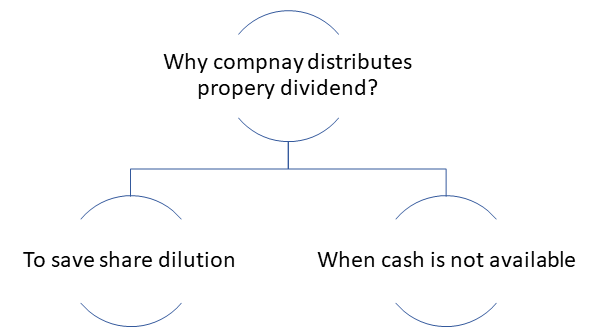What is a property dividend?
A property dividend is a form of a dividend that is distributed among the investors in the form of assets, and not cash or cash equivalents. For instance, a company providing its products as dividends to its investors is said to be distributing a property dividend.
Cash dividends are preferred over property dividends. In case a company is distributing property dividends, then it can be deduced that the company is facing a shortage of cash.
Summary
- A property dividend is a form of a dividend that is distributed among the investors in the form of assets, not cash or cash equivalents.
- Cash dividends are preferred over property dividends.
- In case a company is distributing property dividends, then it can be deduced that the company is facing a shortage of cash
Frequently Asked Questions (FAQs)
What is the working of Property Dividend?
When the company distributes property dividends then the value of the asset distributed is accounted as per its market value. An investor can hold the asset for a longer duration with the aim of earning capital gains in future. Property dividend is not common and not preferred over cash and stock dividends.
The corporates generally distribute the property dividend when they do not want to dilute their current share position while holding onto cash reserves, or they do not have enough cash to meet the dividend requirements. A monetary value is attached to the property dividend but still, in the financial market, a property dividend is seen as a non-monetary dividend form.
Property dividends extend some advantages to the investor as well, that is, the investors can save their taxes or reduce the tax commitment by not liquidating their assets and holding them for a longer duration. In the case of the shareholders also, receiving the income in the form of property or in kind is advantageous as it would lead to lower tax bills, in case the property is not converted into cash by selling the same in the market in exchange for cash.
The company generally prefers the property dividend when the market value of the assets is different from the book value. The difference between the market value and the book value provides flexibility to the company in reducing the taxable income.

Image source: © Monthirayo | Megapixl.com
How are property dividends noted in the book of accounts?
The property dividend is recorded on the fair market value of the property which is distributed to the shareholders.
When would a company choose to distribute property dividends rather than cash or stock dividend?
Property dividend is not a common phenomenon occurring in the financial market, but it is very common that corporates include the provision regarding the property dividend in the agreement that states the terms about the issuance of securities.
Inclusion of the provision is best for both the issuer and the investor, because the asset, which is distributed as a property dividend, must have a market value that is equal to the amount to be distributed.
When a company chooses a property dividend over a stock or cash dividend then it is the obligation of the company to manage their cash flow in such a manner that it ensures the smooth operations of the company for a longer duration.
When a company gives priority to property dividends over cash dividends, then the company desires to avoid the dilution of their current share position while maintaining the current cash reserves. In such cases, the shares of the subsidiary company are generally the assets that are distributed as property dividends. It is generally assumed that the market value of the asset distributed is equal to the amount due to the investor or the amount which is stated in the agreement between the corporate and the investors.
In case the company is facing a lack of cash on a temporary basis, then also a company can issue property dividends rather than the cash dividend. This results in no stress in the current cash flow of the company and simultaneously the investors receive returns on their investment.
By distributing the stocks of a subsidiary company, the company can strengthen its relationship with its investors. Lastly, the tax benefits associated with property dividends cannot be ignored. The company and the investor, both can enjoy the tax benefits as per the tax laws in the area they are located.

What are the facts about property dividends?
- Property dividends are interpreted as non-monetary dividend by the financial markets; however, it has a monetary value.
- With property dividends, the investor can reduce their taxable income by not liquidating their assets and holding the asset for a longer duration.
- Since there is a difference between the fair value and book value, the taxable income of the company also reduces.
- The company distributes property dividend when there is a huge difference between the market value and the book value of the assets that is distributed as dividend.
Let’s understand property dividends with the help of an example
The dividend is distributed to eligible shareholders. Dividend can be defined as the portion of the company’s profitability that is paid to the investors on a yearly, semi-annually, or quarterly basis. Generally, the US companies pay a dividend on a quarterly basis and the companies outside the US pay a dividend on an annual or semi-annual basis. The amount of dividend to be received is dependent upon the number of shares held by the investors. Property dividend stands for the dividend which is paid in kind that is not in the form of cash.
For example, XYZ directors decide to distribute property dividends rather than cash dividends in the year 2021 to their 10,000 shareholders. The dividend amount to be distributed is $500. XYZ company distributes assets worth $500 to each shareholder, leading to a total of $5 million. Now, it is the wish of the shareholders, to either sell the asset and convert it into cash or hold the same for a longer duration and gain capital gains.
 Please wait processing your request...
Please wait processing your request...